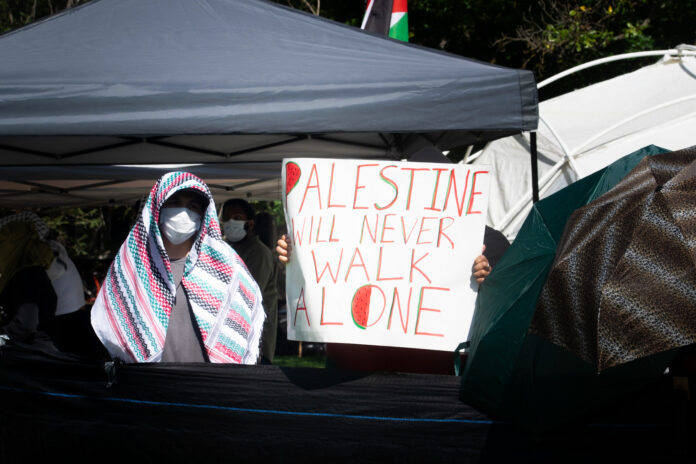Students comment on the worldwide college protests supporting the Palestinian cause
By SABRINA FIGUEROA — features@theaggie.org
As children and innocent civilians continue to be killed in Gaza, students all over the world have come together in solidarity with Palestine, opposing “complicity in the Palestinian genocide,” according to one student group at UCLA — specifically by attempting to convince their universities to fully divest from Israel.
Columbia University’s students were the first to start a pro-Palestinian encampment on April 17, with many other universities following suit.
UC Davis became the eighth UC campus to join the protests when Davis Popular University for the Liberation of Palestine (PULP) set up an encampment at the Memorial Union Quad on Monday, May 6.
Students — both undergraduate and graduate — make up most of the participants of the encampment at UC Davis, according to organizers, though it is open for all ages to join. The encampment offers participating individuals food, first aid, mental health resources, community and an area that creates meaningful conversation about the conflict.
Sophia Rapacon, a second-year electrical engineering major, shared her thoughts on the new Davis encampment.
“I’ve seen people call it ‘disruptive’ to student learning, [but] I thought it was the complete opposite,” Rapacon said. “It exists only as a consistent reminder of the genocide happening in Palestine.”
Ruoda Moler, a second-year political science and psychology double major, also expressed support for the encampments.
“I think it’s great that college students are coming together in large numbers across the country to show their support for Palestine and stand up against a genocide that the entire [U.S.] government and country is turning their backs on,” Moler said. “I’m proud and happy to see that Davis has joined in the movement and I know it will make a difference.”
Mass pro-Palestinian protests have also helped students find comfort in the fact that their peers and the younger generation are willing to fight for what they want and for their futures, according to Rapacon.
“Encampments across U.S. campuses have shown the strength students have in their beliefs, despite what [administration] wants them to believe,” Rapacon said. “It makes me proud to be a student, to be a part of a group unafraid of expressing our values.”
Although many students see the encampments in a more positive light, another student who is involved in the encampment and who wishes to remain anonymous for safety reasons, said that for them, it’s difficult to see police and counterprotesters push back against the encampment and pro-Palestinian protests.
“Seeing the practice of the constitution take place through freedom of speech and freedom of protest be met with violence has been disheartening,” the student said. “Whether or not people agree with the cause, it’s despicable to have students be met with violence, especially while [protesters are] setting stuff up. It has been really hard to watch.”
Violence has been enacted against pro-Palestinian protesters at campuses all across the U.S. — including UC Davis — by counterprotesters, aggressors and law enforcement.
Two recent and violent incidents occurred on the UCLA campus in close succession. On April 30, the UCLA solidarity encampment was attacked by pro-Israel counterprotesters where, as recorded in videos, they were seen throwing fireworks into the encampment, beating students and shouting things like “second Nakba,” which refers to the ethnic cleansing, displacement and dispossession of Palestinians during the 1948 Arab-Israeli war.
More violence ensued a couple days later, when in the early morning of May 2, UCLA Chancellor Gene Block made a decision to call in outside law enforcement. The Los Angeles Police Department then raided and cleared the encampment, shooting rubber bullets at students and arresting about 200 protesters.
“It’s a terrible thing,” the anonymous student said. “[Police brutality] is filled with evil and hatred, and the schools simply cannot respond to matters like this. Causing harm to students who pay for your institution and [are] asking you to allocate your money somewhere that doesn’t harm people shouldn’t be an ask that is so difficult that you must cause violence amongst those groups.”
Moler shared a similar sentiment.
“From what I’m seeing, it seems like the protests are peaceful, and there’s no reason for police to be getting violent and arresting [students who are] exercising their right to protest and free speech,” Moler said. “There’s no reason to escalate [the situation].”
Chancellors and presidents of universities play a large role in these protests, especially with how they choose to handle them. Many — like UCLA Chancellor Gene Block and Columbia University President Minouche Shafik — have lost support over their treatment of protesters from students, faculty and even donating groups and politicians.
Rapacon discussed the role of chancellors and presidents in the encampments, saying that they need to listen to their students to try and understand these protests before assuming there will be violence coming from them.
“Chancellors have to be a funnel of learning for the larger student body, while still giving space and protection for the protesting students,” Rapacon said. “So for chancellors to call police and state troopers on their own students, who simply want to ensure the money they pay to earn a degree isn’t inadvertently funding a genocide, is traitorous.”
The efforts of protesters have not gone unnoticed on the global stage, and protestors’ families, peers and even children in Gaza have shown them support.
These encampments are a sign of hope, according to the anonymous student.
“Watching students work through it and care for one another I think brings a lot of hope, in a ‘If there’s a will, there’s a way’ sort of perspective,” the student said. “It’s really amazing to see how much people will go out of their way to stand up for what they believe is right.”
Written by: Sabrina Figueroa — features@theaggie.org




